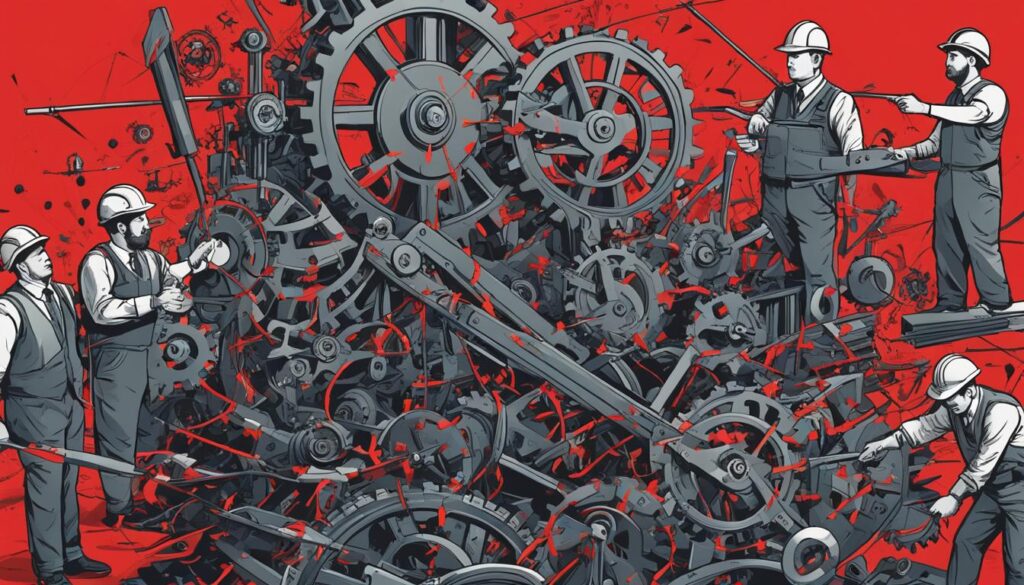Are you looking for a riveting audiobook that provides an in-depth understanding of the financial crisis? Look no further than “The Big Short: Inside the Doomsday Machine” by Michael Lewis.
In this comprehensive audiobook review, we will explore the intricacies of “The Big Short” and how it sheds light on the events that led to the collapse of the housing market. Michael Lewis, known for his insightful writing on finance and Wall Street, takes a deep dive into the systemic issues that contributed to the crisis.
Key Takeaways:
- Michael Lewis’ “The Big Short” is a must-listen for anyone seeking a deeper understanding of the events that led up to the financial crisis.
- Through vivid storytelling, Lewis shines a light on the systemic issues that contributed to the collapse of the housing market.
- The writing style and narration of the audiobook enhance the overall experience and make for an engaging listen.
- “The Big Short” has had a significant impact on society and the financial industry since its release.
- Our overall recommendation is that anyone with an interest in finance and Wall Street should give this audiobook a listen.
Introduction to “The Big Short”
Michael Lewis’ “The Big Short: Inside the Doomsday Machine” is a fascinating exploration of the financial crisis that shook the world in 2008. As an audiobook, it provides listeners with a unique opportunity to dive deep into the causes of the crisis, and the characters who benefited from it immensely.
Before delving into the audiobook review, it’s crucial to understand the book’s premise and its relevance in today’s world. The book’s subtitle, “Inside the Doomsday Machine,” conveys the gravity of the situation and how it nearly destroyed our global economy.
Michael Lewis, a respected author and journalist, is well-known for his insightful works on various topics. He has worked for the New York Times and Bloomberg before becoming a full-time writer. His books, including “Moneyball” and “The Blind Side,” have been adapted into successful films.
In the following sections, we will take a closer look at the plot, writing style, themes, and impact of “The Big Short” and how it provides a comprehensive understanding of the financial crisis.
The Author behind “The Big Short”
| Name | Occupation | Most Famous Works |
|---|---|---|
| Michael Lewis | Author, Journalist | “Moneyball,” “The Blind Side,” “Liar’s Poker,” “Flashboys” |
“The Big Short” is one of Michael Lewis’ most significant works and has received widespread acclaim for its insightful analysis and engaging writing style. In the following sections, we will take a closer look at the book’s premise, plot, and its relevance in understanding the events leading up to the financial crisis that nearly brought the global economy to its knees.
Plot Summary of “The Big Short”
In “The Big Short,” Michael Lewis provides an eye-opening account of the 2008 financial crisis, revealing the inner workings of Wall Street and the people who saw the impending disaster long before anyone else did.
The story centers around four key players: Michael Burry, a hedge fund manager who discovers the impending mortgage crisis and decides to profit from it; Steve Eisman, a hedge fund manager who is deeply skeptical of the housing market and seeks to capitalize on its collapse; Charlie Ledley and Jamie Mai, managing partners of Cornwall Capital, who also bet against the market and face their investors’ skepticism.
As the housing market continues to unravel, the book follows the characters’ journeys through the financial industry, as they battle skepticism from their peers and hope for a payout while the economy tanks.
Writing Style and Narration
Michael Lewis’s writing style in “The Big Short” is clear and concise, allowing readers to easily digest complex financial concepts. Lewis’s use of humor and anecdotes helps to keep the narrative engaging.
The audiobook’s narration by Jesse Boggs is top-notch, effectively bringing the characters and their stories to life. Boggs’ ability to convey emotion and personality through his narration adds depth to the story and draws listeners in.
“Lewis’s writing style is a perfect match for the material at hand. His clarity and wit make for an engaging read that’s accessible to both financial experts and novices.”
Themes and Insights
Michael Lewis’ “The Big Short” sheds light on the financial crisis while uncovering some of the most significant themes and insights. One of the biggest themes explored in the book is the greed that drove many financial players to put their self-interests ahead of their clients’ and the wider community. As Lewis writes, “The incentives for people on Wall Street had become so perverse that those who did acknowledge the bubble and bet against it had to justify themselves.” He reveals the corruption and conflicts of interest that existed, leading to the financial crisis that destroyed the lives of millions of people.
In addition, “The Big Short” exposes the systemic issues that contributed to the financial collapse. Lewis highlights the complacency of regulators and the ratings agencies that gave AAA ratings to dubious assets, promoting their sale to unsuspecting investors. Furthermore, he explores the creativity and complexity of financial instruments such as collateralized debt obligations (CDOs) and mortgage-backed securities (MBSs) which many financial players did not fully understand, contributing to the crisis.

Through careful analysis and research, Michael Lewis provides readers with deeper insights into how the financial crisis unfolded. “The Big Short” is a thought-provoking audiobook that offers answers and explanations on the financial crisis that continue to ripple through our world.
Impact and Reception
Since its initial publication in 2010, “The Big Short: Inside the Doomsday Machine” by Michael Lewis has made a significant impact on both society and the financial industry.
The book sheds light on the catastrophic events that led to the financial crisis of 2008, providing insightful analysis and an informative narrative for readers. The audiobook version of “The Big Short” has also been well-received, with Audible reviewers praising the quality of the narration and its ability to keep listeners engaged.
One of the most significant impacts of “The Big Short” has been its ability to educate and inform the public on the complexities of the financial system. By providing a comprehensive overview of the events that led up to the crisis, the book has spurred discussions on the ethics and accountability of banks and other financial institutions.
Despite its success, “The Big Short” has not been without its critics. Some have argued that the book oversimplifies the complex financial instruments that led to the crisis, while others have criticized Lewis’s portrayal of Wall Street bankers.
Despite any criticisms, the impact of “The Big Short” cannot be denied. It has become a significant piece of literature in understanding the financial crisis, offering valuable insights and a cautionary tale for future generations.
Comparison to the Movie Adaptation
When it comes to book-to-movie adaptations, it can be challenging to capture the essence of the original story. “The Big Short” is no exception. Director Adam McKay brings Michael Lewis’s book to life on the big screen with a star-studded cast, including Christian Bale, Ryan Gosling, and Brad Pitt.
While the movie follows the same general plot as the book, there are some notable differences in storytelling techniques.
In the movie, characters break the fourth wall to explain complex financial concepts directly to the audience. This “explainer” technique is not present in the book, which relies on Lewis’s writing to explain these concepts.
Additionally, the movie takes some creative liberties with certain characters and events. For instance, one of the book’s main characters, Greg Lippmann, is portrayed in the movie by a composite character based on several real-life individuals.
Overall, the movie does an excellent job of capturing the high-stakes drama of the financial crisis. However, it sacrifices some of the depth and complexity of the book in favor of a more entertaining experience.
The Big Short – Audiobook vs. Movie Adaptation Comparison
| Criteria | Audiobook | Movie |
|---|---|---|
| Storytelling techniques | Michael Lewis’s writing style takes the lead in explaining complex financial concepts, without using the “explainer” technique | Characters break the fourth wall to explain financial concepts directly to the audience |
| Fidelity to original source material | Faithful to the book in terms of plot and character development | Takes some creative liberties with certain characters and events, over-simplifies certain aspects of the financial crisis |
| Depth and complexity | Offers a more in-depth analysis of the events leading up to the financial crisis as well as the motivations behind certain characters’ actions | Favors a more entertaining experience, sacrificing depth and complexity for high-stakes drama |
| Overall assessment | The audiobook provides a more thorough and informative examination of the financial crisis and its aftermath | The movie is an entertaining adaptation that captures the high-stakes drama of the crisis, but at the cost of some of the book’s depth and complexity |
“The movie is a fun and engaging adaptation, but if you want a more in-depth analysis of the financial crisis, the audiobook is the way to go.” – Financial Times
Recommendation and Final Thoughts
After completing “The Big Short” audiobook review by Michael Lewis, we highly recommend this book for individuals looking to gain a deeper understanding of the events leading up to the financial crisis. The audiobook not only provides an engaging plot summary but also offers valuable insights into the underlying causes and the aftermath of the crisis itself.
The audiobook also features excellent narration by Jesse Boggs, serving as a great complement to the already captivating book. Boggs does an excellent job of capturing the book’s tone and providing an immersive listening experience, making it perfect for individuals who prefer to learn through listening.
Overall, “The Big Short” is a must-listen for anyone interested in finance, economics, or the broader societal implications of financial crises. It provides a comprehensive examination of the factors that led to the 2008 financial disaster and offers insights into how similar events could be avoided in the future.
Who Would Enjoy It?
- Individuals looking to gain a deeper understanding of the events leading up to the financial crisis
- Listeners who prefer to learn through an immersive experience
- Professionals working in finance or economics
“The Big Short audiobook is a gripping tale of the financial crisis, told in an entertaining way that both educates and intrigues the listener.” – Forbes
Conclusion
After an in-depth analysis of the audiobook “The Big Short: Inside the Doomsday Machine” by Michael Lewis, it is clear that this book offers a valuable perspective on the financial crisis. Through its examination of greed, corruption, and systemic issues, this audiobook provides essential insights into the events that led to the collapse of the housing market.
The writing style employed by Michael Lewis enhances the audiobook experience, providing an engaging and informative journey through the events leading up to the financial crisis. Additionally, the narration quality adds depth to the story, making it an enjoyable listen.
Overall, we highly recommend “The Big Short” as an insightful and educational audiobook. It is particularly relevant to anyone seeking to gain a deeper understanding of the financial crisis and its impact on society. The book’s critical reception has been overwhelmingly positive, and it is evident that it has had a significant impact on the financial industry.
Whether you are looking for an informative listen or an entertaining experience, “The Big Short” is an excellent choice. We encourage you to give it a listen and gain a valuable perspective on one of the most significant financial crises in recent history.
FAQ
Is "The Big Short: Inside the Doomsday Machine" by Michael Lewis available as an audiobook?
Yes, “The Big Short” by Michael Lewis is available as an audiobook.
What is the book "The Big Short" by Michael Lewis about?
“The Big Short” by Michael Lewis is a detailed exploration of the events that led to the collapse of the housing market and the financial crisis.
Who is the author of "The Big Short"?
“The Big Short” was written by Michael Lewis.
What is the writing style like in "The Big Short"?
Michael Lewis employs a compelling and informative writing style in “The Big Short” that keeps readers engaged in the complexities of the financial crisis.
Are there any themes and insights explored in "The Big Short"?
Yes, “The Big Short” delves into themes of greed, financial corruption, and the systemic issues that contributed to the financial crisis.
How was "The Big Short" received by critics?
“The Big Short” received critical acclaim for its examination of the financial crisis and the depth of insights it provides.
Is there a movie adaptation of "The Big Short"?
Yes, “The Big Short” has been adapted into a movie that offers a cinematic portrayal of the events described in the book.
Can you recommend "The Big Short" as an audiobook?
Absolutely. “The Big Short” is highly recommended for its educational value and its ability to captivate listeners with its engaging narrative.



